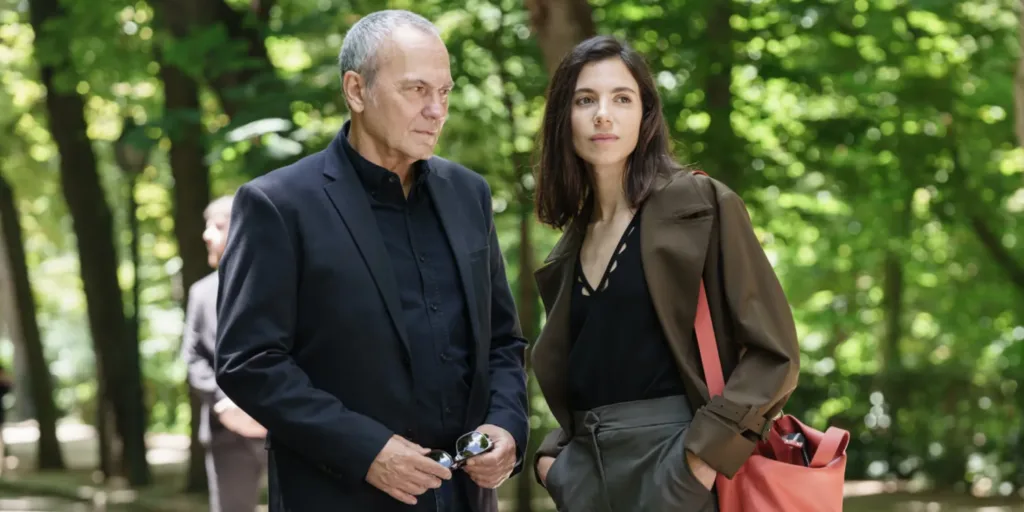The air in “Rotten Legacy” is thick with the kind of unspoken resentments that only families of immense power and crumbling morality can cultivate. We are plunged into the world of the Seligmans, a media dynasty whose influence is as vast as its internal fractures are deep. The return of its patriarch, Federico Seligman, from a two-year battle with cancer, doesn’t signal a heartwarming reunion. Instead, it’s the catalyst for an implosion.
Federico, finding his empire and heirs in disarray, decides his final act will be a tell-all interview, a posthumous grenade lobbed into the foundations of everything he built. This Spanish series immediately establishes a potent brew of ambition, familial strife, and the murky ethics of media control, promising a deep dive into what happens when a king surveys his tainted kingdom and prepares to write its final, damning chapter.
A Gallery of Gilded Cages: The Seligman Players
At the heart of this dynastic drama is Federico, portrayed with a compelling gravitas by Jose Coronado. He’s not simply a benevolent father figure; he’s a man wrestling with his own complicated past, dismayed by the reflection of his own perceived failings in his children. His methods for reclaiming control, or perhaps reshaping his narrative one last time, are as much about genuine conviction as they are about a self-righteous fury. His children orbit him in various states of ambition and damage.
Andrés, ostensibly managing the family newspaper, is mired in financial impropriety, his capabilities constantly measured against an impossible paternal yardstick. Yolanda, who helms a TV station, brings a certain chaotic energy, her professional life and rather public open marriage hinting at a deeper discontent. Then there’s Guadalupe, the politician, striving to carve an identity separate from the family’s tarnished wealth, though her own path is not without its ethical shadows.
Even the youngest, Lara, becomes entangled, a fresher pair of eyes witnessing the corrosion. Their interactions are a chess game of manipulation and thinly veiled hostility, where loyalty is a currency constantly devalued, and business decisions are irrevocably stained by personal vendettas. It reminds me of how often real-world family businesses become battlegrounds for unresolved personal histories, the boardroom table a stage for decades of simmering grievance.
Tangled Threads: Narrative Ambition and Societal Echoes
“Rotten Legacy” doesn’t shy away from weaving a complex tapestry of plotlines, a structural choice that aims for a sprawling, almost novelistic feel. The core struggle for El Baltico, the family’s flagship newspaper, is rife with backroom deals, embezzlement, and the ever-present threat of public exposure.
This is where the series taps into contemporary anxieties about the state of journalism and media ownership; who controls the narrative, and at what cost? The political machinations add another layer, with government conspiracies and election strategies forming a murky backdrop to the Seligmans’ internal wars. It’s a depiction of a world where media and political power are uncomfortably intertwined, a theme that certainly resonates in today’s information landscape.
The series introduces numerous secrets, from the central ticking clock of Federico’s interview to various illicit recordings, alongside a compelling subplot involving Lara and a young man named Leon investigating the suspicious death of his journalist brother—a death Federico might know more about.
While the sheer number of threads, including the criminal enterprises of Guadalupe’s husband Manuel, occasionally threatens to overwhelm, it speaks to an ambition to portray a systemically corrupt world where every character is pulling a string, often unaware of the knots forming elsewhere. The narrative structure, with its rapid reveals, keeps information flowing, perhaps reflecting the relentless news cycle the characters themselves inhabit.
The Aesthetic of Decay: Visuals, Voices, and Velocity
Visually, “Rotten Legacy” leans into a brighter, more saturated palette than one might expect from a tale of such moral decay. This isn’t the cold, steely aesthetic of many corporate thrillers; instead, its world is often colorful, almost lush, which creates an interesting counterpoint to the rottenness within.
Think of it like a beautifully presented meal that you suspect might be poisonous. The performances carry significant weight, with Coronado’s Federico commanding attention as a man whose intensity is matched only by his unpredictability. Belén Cuesta as Yolanda also offers moments of distinctiveness, her character’s often brash exterior hinting at vulnerabilities.
The series moves with a brisk, energetic pace, a choice that keeps the intricate plot moving forward, though at times this velocity can make it challenging to fully absorb the implications of each new revelation. It’s a structure that feels more aligned with contemporary serialized television, designed for continuous engagement, sometimes at the expense of quieter character moments.
The way dramatic and humorous elements are balanced is key here; the series often finds a dark comedy in the self-serving actions of its characters. It’s a viewing experience that demands attention, offering a look at the corrosion of power, not with a detached, clinical eye, but with a certain dramatic flourish that is both engaging and unsettling.
Rotten Legacy premiered on Netflix on May 16, 2025.
Full Credits
Directors: Eduardo Chapero-Jackson, Carlota Pereda
Writers: Pablo Alén, Breixo Corral, Carlos Montero
Producers: Diego Betancor
Cast: Jose Coronado, Belén Cuesta, Diego Martín, María Morera, Natalia Huarte, Susi Sánchez, Iván Pellicer, Nico Romero, Lucas Nabor, Gustavo Salmerón, Mireia Portas, Lluís Marquès
Director of Photography (Cinematographer): Daniela Cajías
Editors: Verónica Callón, David Pelegrín, Noelia Aguilera, Arrate Etxebarria
Composer: Lucas Vidal
The Review
Rotten Legacy
"Rotten Legacy" ambitiously dissects a media dynasty's moral decay through a web of intricate plots and compelling, if flawed, characters. While its narrative density and rapid pacing occasionally risk overwhelming the viewer, strong performances, particularly from Jose Coronado, and its exploration of power, truth, and familial toxicity offer a potent, thought-provoking, and visually distinct drama. It’s a series that pulls you into its vortex of corruption, even if you sometimes struggle to keep every thread untangled.
PROS
- Compelling central patriarch and complex family dynamics.
- Explores relevant themes of media ethics, power, and legacy.
- Visually distinct style that contrasts with its dark themes.
- Strong lead performance by Jose Coronado.
CONS
- Narrative can be overly dense with numerous subplots.
- Rapid pacing may diminish the impact of key moments.
- Some character arcs or plotlines can feel underdeveloped.
- The sheer volume of intrigue can be challenging to follow.
















































